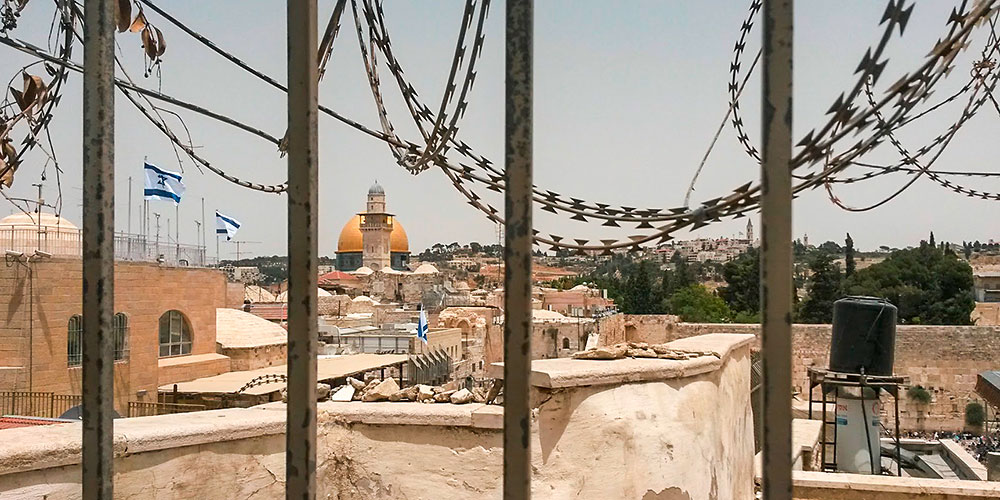Emotions as key to the Middle East conflict.
Text: Stephanie Kirchmayr
Many consider the conflict between Israel and Palestine as intractable. Political scientist and social psychologist Oliver Fink investigates the role of emotions such as humiliation and empathy in this seemingly irreconcilable struggle. To undertake his project, Fink lived and worked in Jerusalem for three years.
Spanning over half a dozen wars and countless attempts at peace negotiations, the conflict between Israel and Palestine is one of the most complex and enduring in the Middle East. “If I were to conduct a street survey in which I asked people to name a never-ending conflict, the one between Israel and Palestine would likely come in first place,” says Oliver Fink, doctoral student and political scientist in the Department of Social Sciences at the University of Basel.
The recalcitrant battle lines between Israel and Palestine are less a question of substantial differences in opinion and more a matter of opposing ideologies and values. That makes this conflict a very emotional one. Oliver Fink aims to use his research to better understand these emotions. In his dissertation project, he investigates how the Palestinian people perceive conflict-related events and how feelings can influence a person’s tendency to commit acts of violence.
Humiliation on the world stage
A person does not simply turn to violence for no good reason. Maybe their own father was arrested, or their brother shot. Many instances of radicalization are preceded by a traumatic experience of political violence. “That’s frequently followed by hate and a desire for revenge,” explains Fink. He uses quantitative surveys to study the impact of negatively charged emotions. His findings show that a person’s inclination toward violence is influenced both by hate and anger as well as by feelings of humiliation.
Demeaning experiences are part of everyday life in the conflict zone and often play out in seemingly insignificant ways. Experiences of waiting in line and harassment at checkpoints can be perceived as humiliating by those targeted. The same goes for when obstinate soldiers bar someone from accessing their own olive trees, even though the grove has been in their family for centuries. “These experiences are extremely unpleasant, but up to a certain point, they are still bearable,” elucidates Fink.
“Violent tendencies become amplified above all when people regard humiliation in public spaces as intentional denigration, or when that humiliation plays out on the world stage.” This became apparent, for example, when the United States government announced that it was relocating its embassy from Tel Aviv to Jerusalem. In doing so, the US implicitly recognized Jerusalem as the capital of Israel alone, rather than that of both states. Fink has vivid recollections from that time. “Right afterwards, there were fierce demonstrations all across the West Bank,” he remembers.
Living between two cultures
The political scientist knows the region well. For three years, he lived with his family in an Israeli town located directly across the border from the West Bank. The morning commute through the checkpoint was part of the family’s everyday routine. Fink worked in Israel while his wife’s job was in Palestine, where the children also attended a German-Palestinian international school. The family made a conscious effort to expose themselves to the otherwise disparate cultures and lifestyles of the two communities. For Fink, this type of participant observation was central to his field research. “I wanted to experience and understand both the restrictions on the Palestinian side and the fear and distrust on the Israeli side,” he elaborates. “It was the only way for me to properly organize my thoughts.”
His contacts in Palestine also provided him with access to crucial research data. Unlike Israel, Palestine does not have the kind of electronic infrastructure that allows researchers to compile large quantities of data rapidly. Researchers need to go from door to door to conduct their surveys. And when it comes to sensitive topics such as violence and emotions, this is no simple undertaking. “Luckily, my contacts in the school and among the Palestinians were very helpful,” says Fink.
From violent acts to peaceful activism
Considering the difficulties involved in collecting data, it seemed serendipitous when Fink and his research group uncovered a collection of written interviews with Palestinians who had formerly engaged in violent behavior. In the pages of these documents, the interviewees described undergoing a change of heart which ultimately saw them come together with Israelis to engage in joint activism projects for peace.
Emotions were key here, too. Fink’s analysis of the reports indicated that an experience of empathy was often a primary impetus for deradicalization. Ahmad, whose name we have changed here, befriended an Israeli prison guard during his time in a detention facility. And Yousef explained how he had watched the film “Schindler’s List,” and saw Jewish people portrayed as victims of violence for the very first time. Experiences or encounters such as these can catalyze a dramatic shift in perspective. “They suddenly realize: They’re going through similar things to those I am,” underscores Fink.
“Common experiences of loss can break intractable cycles of hate and revenge.” The problem here is that empathy is an exceedingly difficult emotion to arouse if someone is not open to it. Most of the time the changes were triggered by random encounters. Looking forward, a more precise analysis of these types of events could help to promote and improve communication between these two populations through mediations and workshops.
The question of how best to achieve lasting peace is a difficult one, and one that far exceeds the scope of Fink’s research. But his study illustrates the significance of psychological factors in the Middle East conflict, both in fomenting violence and in encouraging peaceful solutions. “Your peace accord might look great on paper, but when you’ve got two parties who neither trust nor empathize with one another, even the best deal will end up as wastepaper sooner or later.”
More articles in the current issue of UNI NOVA.

